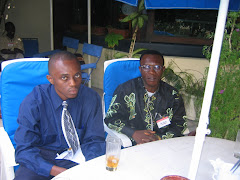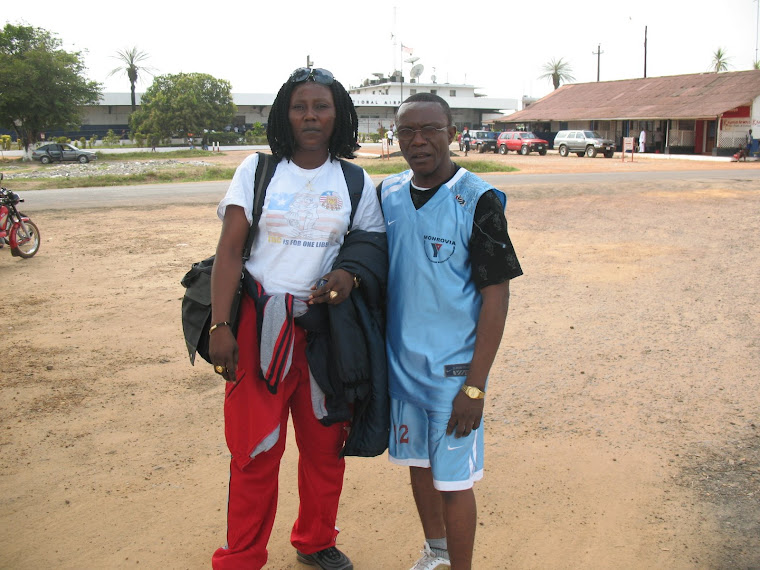Just 2007, when the Republic of Ghana celebrated its golden jubilee of national independence, Ghanaian President John Kufuor showered praises on former president Olusegun Obasanjo for dishing out in 2006 $40 million to get the Ghanaian government out of a choking oil crisis. Acording to reports, President Obasanjo at the time rendered this assistance in an act of a "Big Brother role" without approval of the Federal Assembly. But as Jerry Uwah of Abuja wrote in his article: "the Ingratitude of Ghanaians," it seems that there is a trade and economic stand off developing between Nigeria and Ghana, whereby Ghanaians are feeling that the Nigerians are overshadowing the Ghanaian economy. WWW.Panwhanpen.com brings you an analysis by the Nigerian comumnist:
There is a casual hand bag in the Republic of Ghana derisively tagged "Nigerians are coming". The bag is a mini version of the sack known in Nigeria as "Ghana must go." "Nigerians are coming" derives its name from the shift in the flow of migrants which sees Nigerians trooping to Ghana for investment opportunities. "Ghana Must Go" found its way into the Nigerian lexicon in 1982 when former President Shehu Shagari flushed out thousands of illegal immigrants from the ECOWAS sub-region who had turned Nigeria into one big training camp for criminals.
Ghana had the highest number of illegal immigrants in Nigeria thus making the whole exercise look like an operation directed at Ghanaians alone. They all left in long convoys of Mercedes Benz 911 trucks with their belongings packed into the familiar sack that now attracts the euphemism "Ghana must go".
Those were the days when Ghanaians fleeing economic hardship at home were everywhere in Nigeria. Today, the Ghanaian economy is on a stronger footing. The Nigerian economy is equally strong and several times larger than that of Ghana. But the direction of flow of migrants has changed.
More Nigerians are going to Ghana now than Ghanaians coming to Nigeria. In fact, the few Ghanaians left in Nigeria are returning home. Just like in the 1980s, the change in the flow of migrants is engendered by economic factors. But unlike in the 1980s when Ghanaians trooped to Nigeria in search of food, Nigerians flocking to Ghana now are looking for avenues to invest their petro-dollars.
Though small in size, the Ghanaian economy sits on a very solid electric power base and education system that makes Nigeria look like a primitive society when it comes to investment opportunities. Unilever, a leading multinational company with expansive production facilities in Nigeria, has relocated some of its production lines to Ghana because of the inclement investment weather in Nigeria. Some Nigerian middle class income earners now send their children to Ghanaian universities because of the menace of cultism and incessant strikes in Nigerian universities.
Besides, many Nigerian banks have opened cash offices or subsidiaries in Ghana just to register a foothold.
It is this new trend in the flow of migrants that prompted the naming of the said ubiquitous traveling bag "Nigerians are coming."
Like many other countries in Africa, the Ghanaians are not taking it easy with the massive flow of Nigerian investment into their economy. Despite the fact that such investment creates more jobs in their economy, they see it first as a move by a stronger economy to dominate a weaker one. They are also scared of the "corrupting influence" of the average Nigerian investor.
It is in the light of this that one would see the recent investment law enacted by the Ghanaian government. This law stipulates that foreigners doing business in Ghana must have a capital base of $350,000 (about N41 million) to be allowed to operate. On the surface, the law is designed to protect Ghanaian investors from foreigners with better business acumen and background.
However, the implementation of the investment law suggests that it was designed primarily to tame Nigerians. Some Nigerian businesses have been closed down for allegedly failing to meet the new capital base. No one would complain if the agencies enforcing the new law had meted out equal punishment for every defaulting foreigner. But the reverse is the case.
That is why the words of Salisu Abdul, Nigeria's high commissioner to Ghana, should be considered very weighty.
After months of futile attempts at resolving the matter diplomatically, the high commissioner told the News Agency of Nigeria (NAN) that the lop-sided implementation of Ghana's new investment law clearly indicates that it was targeted at Nigerians.
The Nigerian diplomat contends that the Ghanaian authorities did not close any Lebanese, South African or Kenyan shops in the process of enforcing the new
law. The only shops closed were those of Nigerians. Abdul's attempts at settling the matter through the diplomatic channel met a concrete wall. He booked several appointments with the director-general of Ghana Investment Promotion Commission, but the man would not honour even one. The director-general repeatedly dodged the Nigerian diplomat. When the head of the Nigerian mission exhausted all avenues of settling the matter on his own, he reported to his superiors in Abuja.
The federal government dispatched the minister of commerce to meet the Ghanaian government on the issue. Like the head of the Nigerian mission in Accra, the minister met a stone wall. The Ghanaian government would not play ball.
The matter has now been referred to ECOWAS which has offered to mediate. From all indications, ECOWAS is not likely to make any head way in resolving the trade dispute.
One thing that could easily be noted in the Ghanaian government's stand-off is that Salisu Abdul is a rare breed in Nigeria's diplomatic corps. Nigerian diplomats are not known for putting up that kind of spirited fight for their compatriots in foreign lands.
There were reports of a Nigerian lady who was serving a jail term in Pakistan and delivered a baby while in jail. At the end of her prison term, the Nigerian mission in Pakistan reportedly asked her to invite her relatives in Nigeria to travel to Pakistan and secure a Nigerian passport for the new born baby before she could travel back home.
Abdul's encounter with the Ghanaian government has shown that with men like him in the nation's diplomatic corps, Nigerians in foreign lands could still have a ray of hope. On the other hand, the federal government has been too tolerant of the posture of the Ghanaian government.
There is no reason why the Ghanaian government should single out Nigerian investors for punishment in the implementation of the new law, except for the inferiority complex plaguing all impoverished African countries due to Nigeria's perceived Big Brother posture.
South Africa has virtually taken over Nigeria's economy and no one in Abuja has lifted a finger in protest. Nigerians are not complaining either. They see the development as an employment generating strategy. The world has become one big global village where people can invest wherever the investment climate is friendly.
About 60 per cent of the goods in US retail shops are made in China by subsidiaries of American companies. The availability of cheap labour and high technology in China has compelled hundreds of American and European companies to open production plants in China where they produce at cheaper rates and ship back to their different markets. The Ghanaian government should see Nigerian investors in their land the way Nigerians see South Africans.
They should be assisted to help grow the Ghanaian economy rather than being harassed out of business for the sheer intimidating size of their home economy and population.
As I stated earlier, the federal government is being too docile in its handling of the trade dispute with the Ghanaian government. The size or number of businesses shut down by the Ghanaian government should not be the determining factor in the response of the federal government.
After the reconciliatory move by the minister of commerce was rebuffed by the Ghanaian government, the federal government should have responded with a deadline within which the men in Accra must redress the situation or face retaliatory sanctions.
The smaller countries in Africa are watching the events in Accra with intense curiosity. If the Nigerian government allows the men in Accra to get away with their stupid, discriminatory protectionist law, Liberia may strike right back with a similar embargo despite the massive blood shed and billions of dollars that Nigeria invested in the struggle to end that country's fratricidal war.
Like in Ghana, Nigerian businessmen in South Africa are not having it easy with the host country despite the friendly business environment that South African business men enjoy in Nigeria. The perception of governments all over the world is that Nigerians in foreign lands are on their own. The enormous economic and military muscle of the federal government does not even protect those at home; let alone of those in foreign lands.
Ghana's protectionist law and the discriminatory manner of its implementation is an act of ingratitude when viewed from the fact that former president Olusegun Obasanjo in 2006 dolled out $40 million to get the Ghanaian government out of an asphyxiating oil crisis. Obasanjo was in such haste to act the Big Brother role did not even remember to seek the approval of the National Assembly before advancing that soft loan.
Last year during the 50th anniversary of Ghana's independence, President John Kufuor paid a glowing tribute to the Nigerian government for its generous economic assistance to his country. The same man turned around a few months later to assent a bill that amounts to a trade barrier against Nigerians.
A government that could hit back so hard on its generous donor is definitely not a friend. It should, therefore, not be treated as one.
Wednesday, February 20, 2008
Subscribe to:
Post Comments (Atom)




No comments:
Post a Comment